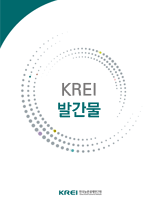요약문
Recently the world grain prices have rapidly sky-rocked. The food self-sufficiency of Korea is only 26.5% in 2007. And Korea is the fifth large food import country among food import countries in the world. Thus, Korea has experienced huge difficulties such as the negative effects on the livestock industry, food industry, and consumer prices. The representative example is the agflation phenomenon which is a compound word of agriculture and inflation.
The direct reason of higher international grain prices is the increase of grain demand for bio-fuel which leads to the competition between the demand for food and demand for energy. Therefore, the trend of combining the food security with the energy security makes the structure of grain supply and demand more complex.
If the grain market structure changes from a circular structure like a business cycle to a chronic extra demand structure, the strategies for securing international grains should be established. The ways of minimizing the negative effects of higher grain prices are the establishment of the early warning system, the expansion of the future market for grains, and the active policy support for setting up the foreign agricultural development import system. In particular, this study focuses on the foreign agricultural development investment. Korea should prepare some ways and strategies to secure food through the foreign agricultural development under the world wide food crisis.
The objective of this study, thus, are as follows,
1) to find out the current situation and prospect of international grain prices
2) to examine the performance of past foreign agricultural development investment
3) to make effective strategies to secure food resources from foreign countries.
Although the foreign agricultural development has started since 1962, the performance of the foreign agricultural development policy has been very limited. The reason of low performance are lack of ex-ante feasibility study, experiences on the large scale farming, customs and laws of foreign countries.
The necessity of the foreign agricultural development policy includes global food crisis, the globalization of Korean agriculture, the provision of alternative utilization of unused agricultural technology and agricultural capital, upgrading the living status of korean in foreign countries.
The agenda to promote the foreign agricultural development policy is the determination of 1) regions to advance, 2) crops to cultivate, 3) methods of implementing investment, 4) roles of public and private sectors, 5) the management system for the foreign agricultural development, 6) relating institutions and policies, and 7) connection with the regulation of WTO.
The direction of the foreign agricultural development policy is to enhance the self sufficient ability for major strategic grains. More detailed measures to secure food through the foreign agricultural development are as follows,
1) to make the ten-year plan for securing major strategic grains,
2) to expand the competitiveness of relating public enterprises and private companies,
3) to induce good domestic companies to advance the foreign agricultural development investment, and
4) to establish the quality and safety control system to bring food producing in foreign countries into Korea.
The strategies of promoting the foreign agricultural development policy are as follows,
1) to establish the custom strategies fitting in regions and grains,
2) to make strategic plans by the implementation stage and period,
3) to implement the foreign agricultural development by the comprehensive approach such as the combination of agriculture and energy,
4) to set up the exclusive organization which has full responsibility about the foreign agricultural development,
5) to find out public finance resources to support public enterprises or private companies which want to participate in the foreign agricultural development projects,
6) to establish the supporting system to provide useful informations and data,
7) to strengthen the good diplomatic relationships with countries which has good advantages in producing grains,
8) to set up the information system for the foreign agricultural development, and
9) to strengthen the connections between the participating companies in the foreign agricultural development and domestic agricultural marketing companies.
저자에게 문의

저자소개
- 김용택
(Kim, Yongtaek)
저자에게 문의

※ 퇴사하신 분이지만 아래의 내용을 입력해 주시면 관리자가 전달해드리겠습니다.
구매안내
KREI의 출판물은 판매 대행사 (정부간행물판매센터)와 아래 서점에서 구입 하실 수 있습니다.
판매대행사
- (주)정부간행물판매센터http://www.gpcbooks.co.kr사이트 바로가기
- 서울특별시 중구태평로 1가 25번지
- TEL 02) 394-0337, 734-6818
- FAX 02) 394-0339
판매서점


